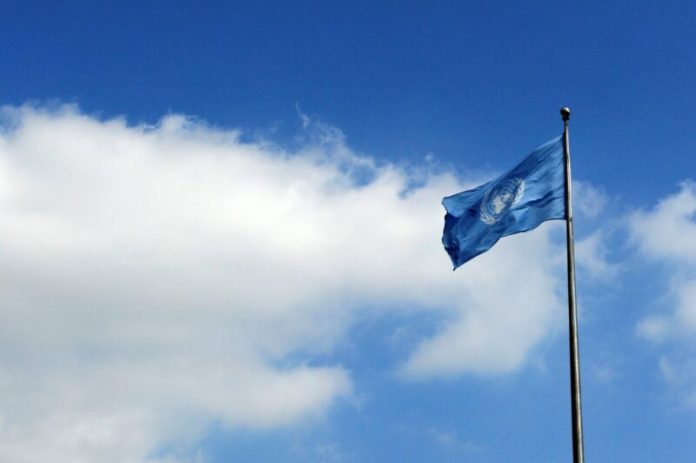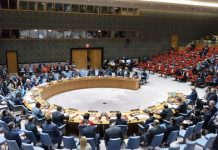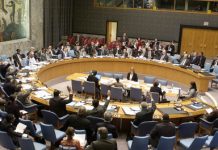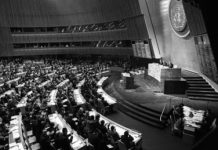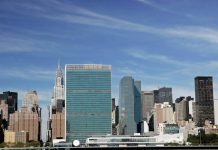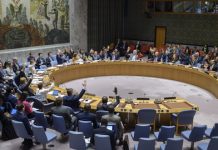US: New executive order set to impact work of the UN
New executive orders issued by the White House are set to further impact the cooperative, multilateral work of the United Nations, two weeks since the United States declared that it was pulling out of the UN health agency, WHO.
According to President Trump’s latest directive, the US will no longer participate in or financially support the Human Rights Council in Geneva, which is set to meet on Friday to discuss the crisis in the DR Congo.
The well-trailed executive order also calls for a review of US membership of UNESCO, the UN agency for Education, Science and Culture.
Leading the review will be the US Secretary of State, who has 90 days to evaluate “how and if” UNESCO supports the interests of the United States.
The third UN agency immediately affected by the order is UNWRA, the UN agency for Palestine refugees, which the White House order maintained “has reportedly been infiltrated” by terrorist affiliates.
The presidential order withdraws US funding from UNRWA and notes the UN agency’s implication in the 7 October attacks on Israel – something which UNRWA strongly condemned and responded to by opening itself up to an investigation, ultimately sacking nine staff for their possible involvement.
By 4 August 2025 – in just six months’ time – the order also calls for a review of US membership in “all international intergovernmental organizations” and all conventions and treaties.
UN Spokesperson Stéphane Dujarric said in response to questions regarding the latest order, that “from day one” it has been clear that US support for the UN has “save countless lives and advanced global security.”
“As I have mentioned, the Secretary-General looks forward to speaking to President Trump, he looks forward to continuing what was a very frank and productive relationship during the first term.
Mr. Dujarric recalled President Trump’s remarks in the Oval Office on Tuesday where he said the UN has lots of potential and has a critical role to play in taking on many big challenges facing the world.
135,000 women in Africa could die from breast cancer by 2040, warns WHO
An estimated 135,000 women could die from preventable breast cancer by 2040 in sub-Saharan Africa without urgent action, the World Health Organization (WHO) has warned.
According to a WHO study in 42 of the region’s 47 countries, there are significant gaps and disparities in breast cancer control.
Key findings included a critical shortage of healthcare workers who are essential for prevention, diagnosis and treatment.
Tackling breast cancer is also limited by a lack of access to specialized cancer centres, WHO said.
The UN health agency found that only five out of 47 countries in sub-Saharan Africa have regular breast cancer screening programmes. Lab screening facilities are also lacking, with only two countries meeting the standard of one lab per 100,000 people.
Breast cancer-related deaths in the region continue to be driven by late diagnosis and insufficient prevention and care. Much more healthcare investment is needed, WHO insisted.
In 2022 alone, the UN agency said that 38 out of every 100,000 women were diagnosed with breast cancer and 19 per 100,000 died from the disease.
Tunisia: top rights panel demands immediate release of activist on hunger strike
Top independent rights experts reiterated their call to the Tunisian authorities on Wednesday to release an imprisoned activist who is intensive care after going on hunger strike.
Sihem Bensedrine, who is 75, was the former president of the Truth and Dignity Commission in Tunisia until she was detained in August last year.
In a joint appeal, the independent rights experts insisted that Ms. Bensedrine must be immediately and unconditionally released, and any charges against her dropped.
The rights experts – Special Rapporteurs Bernard Duhaime, Mary Lawlor and Margaret Satterthwaite – said that her arrest appeared to be in retaliation for her activism.
In particular, they cited her contribution to the Truth and Dignity Commission’s report which they said “should lead to the prosecution of alleged perpetrators of serious violations of past regimes”.
The Tunisian commission was established in 2014 in collaboration with the UN human rights office and the UN Development Programme. It was tasked with investigating alleged abuses going back six decades as well as acting as an arbiter in cases of corruption and gross human rights violations.
Ms. Bensedrine is accused of falsifying the Commission’s report on corruption in the banking system and has been the subject of judicial investigations since 2021, before her pre-trial detention last year.
The Human Rights Council-appointed independent experts further argued that Commission members and staff cannot be held liable for any content, conclusions, or recommendations in the report, as their work was carried out in line with their mandate.
Daniel Johnson, UN News.
Source of original article: United Nations (news.un.org). Photo credit: UN. The content of this article does not necessarily reflect the views or opinion of Global Diaspora News (www.globaldiasporanews.com).
To submit your press release: (https://www.globaldiasporanews.com/pr).
To advertise on Global Diaspora News: (www.globaldiasporanews.com/ads).
Sign up to Global Diaspora News newsletter (https://www.globaldiasporanews.com/newsletter/) to start receiving updates and opportunities directly in your email inbox for free.


